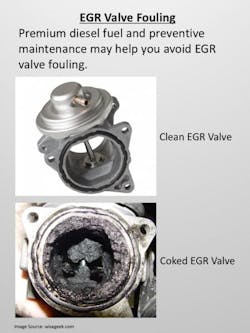EGR Systems Run Cleaner with Premium Diesel Fuel
Most diesel engines in the U.S. use a combination of technologies to reduce emissions. Usually there will be a diesel particulate filter (DPF), selective catalytic reduction (SCR) with urea (DEF fluid), and an EGR system. An effective EGR system paired with these technologies will reduce nitrous oxide (NOx) in the exhaust for cleaner emissions.
While the basic concept of how EGR reduces NOx is fairly straightforward, the problems it creates are a bit more complex. EGR systems need care and maintenance to prevent fouling, reduce downtime and keep engines running smoothly at full efficiency.
Understanding EGR Systems
NOx formation progresses faster at high combustion temperatures. By sending some exhaust gas back to the cylinders and reducing oxygen in the burn, EGR cools combustion to a level that helps reduce NOx to EPA standards.
However, EGR also makes engines more susceptible to severe fouling. The fouling deposit layer is a blend of particulates and hydrocarbons that stick to heat exchanger surfaces. Thermal efficiency, engine performance and reliability can drop as these deposits build. The EGR valve itself can foul, resulting in engine hesitation or poor fuel economy that might seem like a vacuum line problem. While the EGR valve is fairly easy and inexpensive to replace, other more-expensive engine components, including the EGR cooler and turbocharger, can also become fouled. Poor efficiency in those components can reduce fuel economy and lead to costly repairs and downtime.
How Fuel Quality and Maintenance Help Prevent EGR Fouling
A high-quality fuel that contains detergents and injection stabilizers will result in cleaner fuel injectors, less fuel breakdown under pressure and heat, and better spray patterns that produce more complete combustion and less soot at the very beginning of the process. Additives in premium diesel fuel help reduce fouling of the EGR valve, EGR cooler and turbocharger.
A typical #2 diesel can burn incompletely and leave deposits. Using a premium diesel fuel with an injection stabilizer, such as Cenex® Roadmaster XL®, assures a more complete burn. Another characteristic of premium diesel fuel is a higher cetane number, a measure of ignition quality in diesel fuel that increases power and fuel economy while reducing pollution.
In addition to the quality of your fuel, other maintenance tips may help minimize soot and ash buildup in your EGR system. Reducing engine idling time when possible, as well as changing all fluids and filters on a regular maintenance schedule will lessen potential fouling. Consider a high-quality, low-ash engine oil to help with engine performance and operability as well. Conducting an oil analysis on every drain cycle to look for early signs of engine trouble is also recommended, and if you see any engine warning lights or signs of engine hesitation, address it quickly to help avoid costly repairs or extended downtime.
These maintenance tips, as well as running a premium diesel fuel, will help provide you with a complete cleaner burn, which should always be your goal for engine longevity and fleet efficiency.
For more information, visit www.cenex.com.

